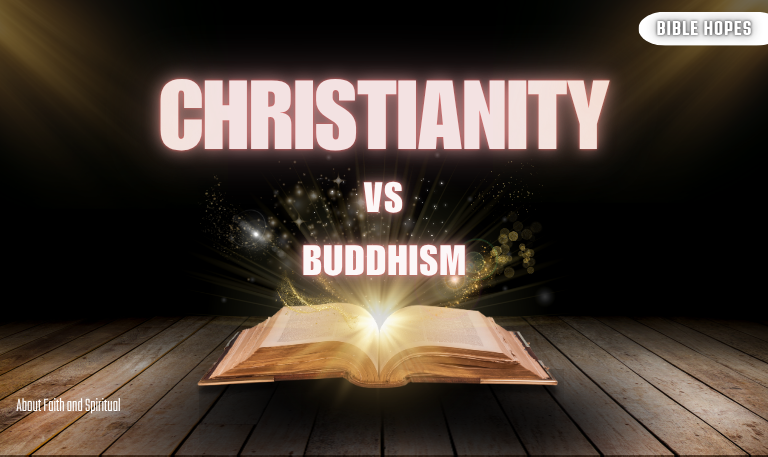Christianity and Buddhism are two of the world’s most influential and widely practiced religions, each shaping cultures, philosophies, and lives for millennia. While Christianity is rooted in monotheism with a focus on faith in God and salvation through Jesus Christ, Buddhism is a nontheistic tradition emphasizing personal enlightenment through mindfulness and ethical living.
This article offers a detailed comparison between Christianity vs Buddhism, highlighting their origins, beliefs, practices, and key philosophical tenets. By the end, you will gain clarity on how these religions intersect and diverge, enriching your understanding of both spiritual paths.
1. Origins and Historical Background
Christianity: Roots in Ancient Judaism
Christianity originated in the 1st century CE in the Roman province of Judea. It centers on the life, teachings, death, and resurrection of Jesus Christ, whom Christians recognize as the Son of God and Savior. Emerging from Jewish traditions, Christianity quickly spread across the Roman Empire and beyond.
Buddhism: The Awakening of Siddhartha Gautama
Buddhism began around the 5th to 6th century BCE in India with Siddhartha Gautama — the Buddha, meaning “the awakened one.” He taught a path to liberation from suffering through ethical conduct, meditation, and wisdom.
Spread and Influence
Christianity evolved into multiple denominations globally, including Catholicism, Protestantism, and Orthodoxy. Buddhism also diversified into Theravāda, Mahāyāna, and Vajrayāna traditions, influencing Asia and increasingly the West.
Read Also: Hebrew Vs Aramaic
2. Core Beliefs and Philosophical Foundations
| Aspect | Christianity | Buddhism |
|---|---|---|
| Concept of God | One God (Trinity: Father, Son, Holy Spirit) | Non-theistic, no creator god |
| Nature of Humanity | Created in God’s image, fallen due to sin | No permanent self (Anatta), impermanence |
| Ultimate Goal | Salvation and eternal life with God | Enlightenment (Nirvana), liberation from suffering |
| Path to Goal | Faith in Jesus, grace, repentance | Eightfold Path: right view, intention, speech, etc. |
| Sacred Texts | Bible (Old & New Testament) | Tripitaka, Sutras, and commentaries |
Theological Differences
Christianity emphasizes belief in a personal God and redemption through Jesus Christ. Buddhism focuses on self-realization, ethical behavior, and mental discipline without dependence on a deity.
3. Concept of God and Divinity
Christianity’s Monotheism
Christianity professes belief in one God who exists in three persons — the Father, the Son (Jesus Christ), and the Holy Spirit. Jesus’ divinity and resurrection are central.
Buddhism’s Non-Theism
Traditional Buddhism does not worship a creator god. While gods (devas) appear in Buddhist cosmology, they are impermanent beings not central to liberation.
4. The Path to Salvation and Enlightenment
Christianity: Salvation by Faith and Grace
Christian doctrine teaches that salvation is a gift from God, obtained by faith in Jesus Christ’s sacrifice and resurrection.
Buddhism: The Eightfold Path
Buddhism prescribes an eightfold path encompassing right understanding, intention, speech, action, livelihood, effort, mindfulness, and concentration as steps toward enlightenment.
5. The Role of Suffering
Christianity: Suffering as a Consequence of Sin
Suffering exists due to human sin and separation from God but can have redemptive value. Christians believe God can bring good from suffering.
Buddhism: Suffering as Universal (Dukkha)
Buddhism teaches that suffering is intrinsic to life, arising from attachment and ignorance. Liberation comes by overcoming desire and ignorance.
6. Moral and Ethical Teachings
| Christianity | Buddhism |
|---|---|
| Ten Commandments guide moral behavior. | Five Precepts govern ethical conduct: no killing, stealing, sexual misconduct, lying, intoxication. |
| Emphasis on love, forgiveness, and charity. | Emphasis on compassion, non-harm (Ahimsa), and wisdom. |
7. Afterlife Beliefs
Christianity: Heaven and Hell
Christianity teaches eternal life with God in Heaven or eternal separation in Hell, determined by faith and actions.
Buddhism: Rebirth and Nirvana
Buddhism believes in cyclical rebirth influenced by karma until one attains Nirvana — the cessation of suffering and rebirth.
8. Worship Practices and Rituals
| Christianity | Buddhism |
|---|---|
| Church services, sacraments (e.g., Communion), prayer, singing hymns. | Meditation, chanting, offerings, rituals honoring Buddha and bodhisattvas. |
9. Role of Clergy and Religious Leaders
Christianity
Priests, pastors, bishops, and the Pope (Catholicism) lead worship, teach, and administer sacraments.
Buddhism
Monks, nuns, lamas, and spiritual teachers maintain monasteries, guide meditation, and preserve scriptures.
10. Symbols and Iconography
| Christianity | Buddhism |
|---|---|
| Cross, fish (Ichthys), dove, lamb. | Dharma wheel, lotus flower, Buddha statues. |
11. Views on Human Nature and the Self
Christianity
Humans have immortal souls created in God’s image but are fallen and in need of redemption.
Buddhism
The self is an illusion (Anatta), impermanent and interconnected with all existence.
12. Meditation and Prayer Practices
| Christianity | Buddhism |
|---|---|
| Prayer: petition, thanksgiving, intercession, contemplation. | Meditation: mindfulness, concentration, loving-kindness (Metta). |
13. Role of Women in Christianity and Buddhism
Christianity has varied roles across denominations, from limited leadership to ordained clergy.
Buddhism traditionally restricts monastic roles for women in some sects but has seen growing inclusion.
14. Interfaith Dialogue and Comparative Theology
Shared values: compassion, ethical living, and spiritual development.
Divergences: Theism vs non-theism, nature of salvation/enlightenment, afterlife concepts.
Read Also: NIV vs ESV Bible
15. Common Misconceptions
Buddhism is not a religion: It is a religion/philosophy with rituals, ethical codes, and spiritual goals.
Christianity is intolerant: Christianity has diverse traditions, many emphasizing love and acceptance.
16. Contemporary Relevance
Both religions adapt to modern contexts—Christianity in global humanitarian work and Buddhism’s mindfulness influencing mental health practices worldwide.
Christianity Vs Buddhism FAQs
Q1: Is Buddhism a religion or philosophy?
A: Buddhism is both—a religion with rituals and community, and a philosophy emphasizing practical wisdom.
Q2: Can Christians practice Buddhist meditation
A: Many do, adopting mindfulness without conflicting with Christian beliefs.
Q3: Do Buddhism and Christianity share teachings?
A: Yes, particularly in ethics like compassion and love.
Q4: What are the main differences?
A: Christianity centers on God and salvation through Jesus; Buddhism on enlightenment through self-effort.
Q5: Is Jesus mentioned in Buddhist texts?
A: Not traditionally, but some modern scholars explore parallels.
Conclusion
Christianity and Buddhism each offer profound and distinct approaches to understanding life, suffering, and the ultimate purpose of human existence. While Christianity centers on a personal relationship with a loving God and salvation through faith in Jesus Christ, Buddhism emphasizes self-awareness, ethical living, and liberation from suffering through enlightenment. Despite their differences in theology and practice, both religions share common values such as compassion, moral integrity, and the pursuit of inner peace.



![15 Pink Bible Verses | Discover Meaning, Love [2025 Guide] 5 15-Pink-Bible-Verses-Discover-Meaning,-Love-[2025-Guide]](https://biblehopes.com/wp-content/uploads/2025/05/15-Pink-Bible-Verses-Discover-Meaning-Love-2025-Guide.png)